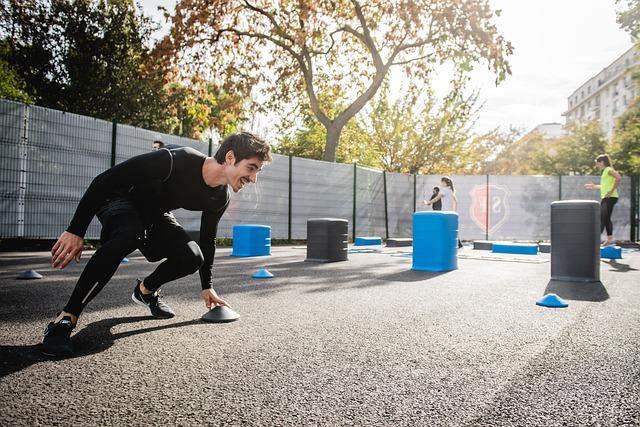In today’s fast-paced world, where stress and mental health challenges increasingly permeate daily life, families are seeking effective strategies to enhance their collective well-being. One often overlooked yet powerful tool is physical exercise. Beyond its well-documented physical benefits, exercise plays a crucial role in bolstering mental wellness, particularly within the family unit. This article delves into the multifaceted impact of physical activity on family mental health, examining how shared exercise experiences can foster stronger emotional bonds, reduce stress, and enhance overall psychological resilience. By analyzing recent studies and expert insights, we aim to illuminate the transformative potential of integrating physical exercise into family routines, offering a pathway to improved mental health and familial harmony.
Understanding the Psychological Benefits of Family Exercise
Engaging in physical activities as a family not only strengthens the body but also fosters emotional bonds and enhances mental health. When family members exercise together, they create shared experiences that lead to increased emotional support and a sense of belonging. This collaborative environment promotes open communication and reduces feelings of isolation, thereby improving overall family dynamics.
- Stress Reduction: Group exercise acts as a natural stress reliever, providing an outlet for emotional tension and promoting relaxation.
- Improved Mood: The release of endorphins during physical activity can lead to heightened feelings of happiness and positivity, which are shared among family members.
- Enhanced Cognitive Function: Regular family workouts contribute to better focus and mental clarity, benefiting both adults and children in their daily activities.
Moreover, setting and achieving fitness goals as a family instills a sense of accomplishment and boosts self-esteem. These psychological benefits extend beyond individual well-being, reinforcing the family’s collective mental resilience and fostering a harmonious home environment.

Exploring the Social Dynamics of Group Workouts
When families engage in group workouts, they create a unique ecosystem of support and motivation that extends beyond physical health. The shared experience of exercising together fosters a sense of camaraderie and accountability, allowing family members to encourage one another and celebrate each other’s progress. This collective journey not only enhances physical fitness but also contributes to mental well-being by reducing stress and promoting emotional resilience.
Furthermore, the social dynamics of group workouts within a family setting can lead to improved communication and stronger relationships. Key benefits include:
- Enhanced bonding: Working out together provides opportunities for meaningful interactions and shared achievements.
- Stress reduction: Physical activity releases endorphins, and doing it as a group amplifies the mood-boosting effects.
- Role modeling: Parents can set positive examples of healthy habits, encouraging children to value fitness and mental health.
- Increased motivation: The presence of family members can serve as a powerful motivator to stay consistent with fitness routines.

Implementing Structured Exercise Routines for Mental Health Improvement
Incorporating structured exercise routines into family life can be a game-changer for mental health. Physical activity is not just a tool for improving physical health; it also plays a significant role in boosting mental wellness. Families that engage in regular exercise together often experience a reduction in stress levels, improved mood, and stronger emotional connections. The benefits are multifaceted and can lead to a more harmonious home environment.
- Stress Reduction: Exercise releases endorphins, the body’s natural mood lifters, which can alleviate stress and anxiety.
- Enhanced Mood: Physical activity can lead to a more positive outlook, reducing symptoms of depression.
- Improved Sleep: Regular exercise can regulate sleep patterns, leading to better rest and mental clarity.
- Increased Family Bonding: Participating in activities together fosters communication and strengthens relationships.
Establishing a routine that includes a mix of cardiovascular exercises, strength training, and flexibility activities can ensure that all family members benefit. This holistic approach not only promotes mental wellness but also encourages a supportive and active lifestyle, reinforcing the idea that mental health is a family affair.

Crafting Personalized Family Fitness Plans for Emotional Wellbeing
Designing a family fitness plan that caters to individual emotional needs requires a deep understanding of each family member’s preferences and challenges. Physical exercise serves as a cornerstone for mental wellness by releasing endorphins, reducing stress, and fostering emotional connections. A personalized approach ensures that the fitness routine is not just a task, but a source of joy and bonding.
- Incorporate diverse activities: From yoga to team sports, varying activities can cater to different emotional needs, whether it’s seeking calm or craving excitement.
- Set realistic goals: Tailor goals to be achievable, promoting a sense of accomplishment and enhancing self-esteem.
- Prioritize fun: Keep the focus on enjoyment to naturally encourage participation and consistency.
- Involve everyone in planning: Let each member have a say in the schedule to ensure their emotional needs and preferences are met.
By crafting a fitness plan that acknowledges emotional wellbeing, families can create a supportive environment that nurtures both body and mind, strengthening bonds and promoting a positive atmosphere at home.



